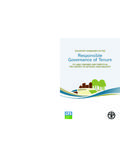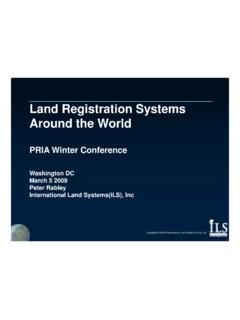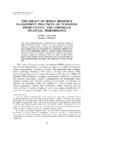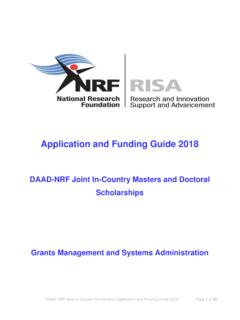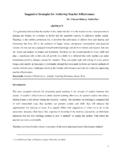Transcription of Bottom-up Accountability Initiatives to Claim Tenure ...
1 Bottom-up Accountability Initiatives to Claim Tenure Rights in Sub-Saharan Africa:Collaborative action research on the rush for land and water in Uganda, Mukono District2 | Bottom-up Accountability Initiatives to Claim Tenure Rights in Sub-Saharan AfricaPublished by FIAN & TNIFIAN InternationalWilly-Brand-Platz 569115 Heidelberg, GermanyMembers of the Research team: Nakato Margaret, Namaganda Rehema Bavuma and Vaal Benjamin NamuggaEditor: Katie SandwellDesign: Bas CoenegrachtMade possible by financial support from the International Development Research Centre (IDRC) : All opinions expressed in this publication are those of contributing authors and do not necessarily represent the views of the publishers.
2 Contents of this publication may be quoted or reproduced, provided that the source of information is acknowledged. The publishers would like to receive a copy of the document in which this report is used or , Heidelberg September 2017 TNIDe Wittenstraat 251052AK Amsterdam, NetherlandsBottom-up Accountability Initiatives to Claim Tenure Rights in Sub-Saharan Africa | 32 | Bottom-up Accountability Initiatives to Claim Tenure Rights in Sub-Saharan AfricaTable of Contents Summary of the report 51 Background and context of the research area 5 Geographical Context 5 Mukono District 7 Foreign Direct Investment 9 A brief overview of land Tenure systems
3 In Uganda 10 History and legal framework 10 Tenure Rights of lands surrounding lakes in Uganda 12 The struggles of fishing communities in Uganda 13 KWDT and its engagements in defending community customary land rights/fisheries rights 132 The case study, research problem and questions 15 The case study: Nangoma, Buleebi, Mbale and Kiziru in Mpunge sub-county in Mukono district of Central Region in Uganda 15 Location and Demography 15 Drivers of Land/Lake grabbing in the research communities 16 The general increase in food (fish)
4 Prices in the country 16 Land adjacent to the lake 17 Promoting Foreign Direct Investments 17 Land laws and policies 17 Agribusiness 17 Other Drivers 173 The research methodology 17 Methods and activities 17 The Research participants 20 The Research challenges 204 | Bottom-up Accountability Initiatives to Claim Tenure Rights in Sub-Saharan Africa4 Access to and governance of land and fisheries resources in the fishing communities in Mukono 20 Mapping shifting trends in access by the fishing communities 20 Actual situation of access to land in the different research communities 21 Local communities knowledge.
5 Visions and practices regarding natural resource governance 21 Strengthening the research capacity of small scale food producers, gaps, obstacles and possible steps 25 Evaluation of governance of land surrounding the lake/ Fishery resources in Uganda basing on the provisions of the Tenure Guidelines 28 Legal Frameworks and Policies 28 Conclusions on the situation of the governance of / access to Fishery resources for people in Mukono 285 The Action Research Process 29 Re-training of the land pressure group 29 Training all women group
6 Leaders, in land laws 296 Results of the Action research in the light of Bottom-up Accountability in LSLA 29 Conclusions and Recommendations 29 Annex 1 Land Search Reports 30 Endnotes 31 Bottom-up Accountability Initiatives to Claim Tenure Rights in Sub-Saharan Africa | 54 | Bottom-up Accountability Initiatives to Claim Tenure Rights in Sub-Saharan AfricaSummary of the reportThis action research project is
7 Being implemented by KWDT with support from TNI and FIAN. The action research project aims to answer the following questions and achieve the objectives therein: understanding the local commu-nities knowledge, visions and practices regarding natural resource governance and development, strengthening the research capacity of small scale food producers organisations, identifying the main gaps in and obstacles to applying international human rights law to land, and strengthening the advocacy capacity of small scale food producers, and identifying strategies to overcome the above-mentioned gaps.
8 Participatory research methods have been used to ensure active participation of the people being affected. These include focus group discussions, key informant interviews, community dialogues, household in-depth interviews, and a review of literature, as well as informal discussions with community members and leaders. The current phase of the project, however, (year 3 of the project), is action oriented, engaging the affected communities in analysing, under-standing, and taking active steps towards solving the problems of land grabbing in their communities.
9 Findings reveal that lawlessness (in some cases), ignorance of the law, evictions and unlawful relocations, increasing pressure and conflicts emerging in fishing communities, as well as neighbouring farming communities are all leading to communities losing access to the land and fishing grounds on which they have survived for many years, leading to unemployment and loss of livelihoods among the fisher folks. Other issues revealed by the project include: increased hostility aggravating existing tribal differences among the people, obstruction of much needed local investments as well as increased vulnerability of women.
10 The project has empowered local community members not only to better understand the dynamics surrounding large scale land acquisition in their area, but also to address these challenges and increase their resistance to land grab-bing. This report gives the background and context of the research, clarifies the legal and policy framework governing the use of land in Uganda, provides background on the Mukono district, and lays out the research problem, the method-ology, findings and emerging issues of the study, as well as providing recommendations and ideas for further action.
